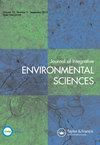泰国棕榈油生产产生的非二氧化碳温室气体排放
IF 3.5
4区 环境科学与生态学
Q3 ENVIRONMENTAL SCIENCES
Journal of Integrative Environmental Sciences
Pub Date : 2015-12-02
DOI:10.1080/1943815X.2015.1110184
引用次数: 10
摘要
在过去的二十年里,全球对棕榈油的需求一直在增加。因此,油棕种植园和棕榈油生产不断扩大,尤其是在东南亚。这导致了许多环境问题。在本研究中,我们关注世界第三大棕榈油生产国泰国棕榈油生产的非二氧化碳温室气体排放。在生产过程中,燃料燃烧通常会排放二氧化碳(CO2)。此外,棕榈油生产过程中还会排放甲烷(CH4)和一氧化二氮(N2O)。根据对泰国棕榈油生产的未来预测,我们量化了当前和未来的甲烷和氧化亚氮排放量。我们的分析区分了油棕种植园和棕榈油加工厂的排放。研究表明,氮肥是N2O排放的主要来源,而CH4的排放主要来自空果束管理不当和废水管理。我们还分析了减少CH4和N2O排放的可能方案的影响,说明了未来减排的潜力。本文章由计算机程序翻译,如有差异,请以英文原文为准。
Non-CO2 greenhouse gas emissions from palm oil production in Thailand
Abstract The global demand for palm oil has been increasing during the past two decades. As a result, there has been an expansion of oil palm plantations and palm oil production, in particular in South East Asia. This contributes to a number of environmental problems. In this study, we focus on non-CO2 greenhouse gas emissions from palm oil production in Thailand, the third largest palm oil producing country in the world. Carbon dioxide (CO2) is typically emitted during fuel combustion in production processes. In addition, methane (CH4) and nitrous oxide (N2O) are emitted during palm oil production. We quantified current and future emissions of CH4 and N2O based on future projections for palm oil production in Thailand. Our analysis distinguishes between emissions from oil palm plantations and palm oil processing mills. Our study shows that nitrogen fertilizers are the main source of N2O emissions, while CH4 is emitted mainly from inappropriate management of empty fruit bunches and wastewater management. We also analysed the effect of possible options to reduce emissions of CH4 and N2O, illustrating the potential for emission reduction in the future.
求助全文
通过发布文献求助,成功后即可免费获取论文全文。
去求助
来源期刊

Journal of Integrative Environmental Sciences
ENVIRONMENTAL SCIENCES-
CiteScore
3.90
自引率
0.00%
发文量
13
审稿时长
>12 weeks
期刊介绍:
Journal of Integrative Environmental Sciences (JIES) provides a stimulating, informative and critical forum for intellectual debate on significant environmental issues. It brings together perspectives from a wide range of disciplines and methodologies in both the social and natural sciences in an effort to develop integrative knowledge about the processes responsible for environmental change. The Journal is especially concerned with the relationships between science, society and policy and one of its key aims is to advance understanding of the theory and practice of sustainable development.
 求助内容:
求助内容: 应助结果提醒方式:
应助结果提醒方式:


